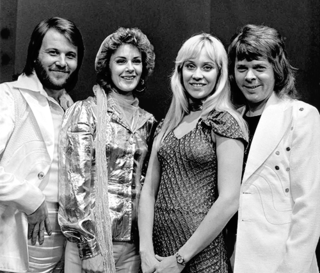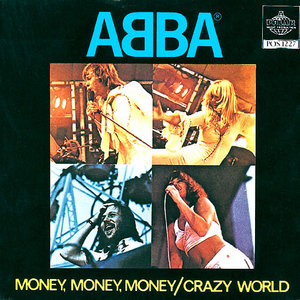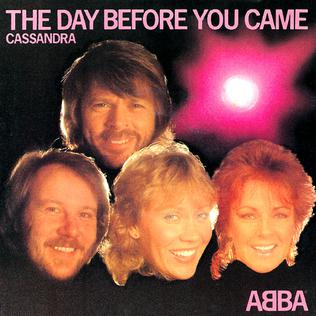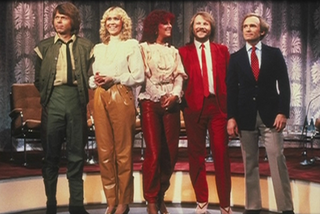
ABBA were a Swedish pop group formed in Stockholm in 1972 by Agnetha Fältskog, Björn Ulvaeus, Benny Andersson, and Anni-Frid Lyngstad. They are one of the most popular and successful musical groups of all time, and are one of the best-selling music acts in the history of popular music.

Agneta Åse Fältskog, known as Agnetha Fältskog and AnnaFältskog, is a Swedish singer, songwriter and a member of the pop group ABBA. She first achieved success in Sweden with the release of her 1968 self-titled debut album. She rose to international stardom in the 1970s as a member of ABBA, which is one of the best-selling music acts in history. She is the youngest member of ABBA, and the only one born in the 1950s.

ABBA: The Album is the fifth studio album by the Swedish pop group ABBA. It was released in Scandinavia on 12 December 1977 through Polar Music, but due to the massive pre-orders the UK pressing plants were not able to press sufficient copies before Christmas 1977 and so it was not released in the UK until January 1978. The album was released in conjunction with ABBA: The Movie, with several of the songs featured in the film. Altogether the album contains nine songs.

"Money, Money, Money" is a song recorded by Swedish pop group ABBA, written by Benny Andersson and Björn Ulvaeus with Anni-Frid Lyngstad singing lead vocals. It was released on 1 November 1976, as the second single from their fourth album, Arrival (1976). The B-side, "Crazy World", was recorded in 1976 during the sessions for the ABBA album. The song is sung from the viewpoint of a woman who, despite hard work, can barely keep her finances in surplus, and therefore desires a well-off man.

"Under Attack" is a song by Swedish pop group ABBA, released in December 1982 as the second and final single from the compilation The Singles: The First Ten Years.

"The Day Before You Came" is a song recorded by Swedish pop group ABBA, released in October 1982 as the lead single from the compilation album The Singles: The First Ten Years.

"Eagle" is a song recorded in 1977 by Swedish pop group ABBA. It was the opening track on their fifth studio album, ABBA: The Album (1978), and at 5 minutes 51 seconds, the longest they ever released. As the third and final official single from the album, it was issued in a limited number of territories. These did not include the United States, where an intended release was cancelled, or United Kingdom.
"Intermezzo No. 1" is an instrumental track from Swedish pop group ABBA's self-titled third album, released in April 1975. It was the first of only two tracks by the group not to contain lyrics; the other was the title track of their 1976 release, Arrival. It is the only purely instrumental ABBA song however, as Arrival includes "a static layer of rich harmony vocals". On the cover, the song was credited as "Intermezzo No.1 featuring Benny Andersson".
"Dum Dum Diddle" is a song by ABBA, released on their 1976 album Arrival. In 1977 it was released as a promo single in Argentina on the RCA label.
"Me and I" is a song from ABBA's 1980 album Super Trouper. As with much of ABBA's 1980s output, the song features use of a synthesizer, and some have classified the song as synthpop. Anni-Frid Lyngstad sang the lead vocals.
"The Piper" is a track from the 1980 album Super Trouper, by Swedish pop group ABBA. The song is loosely based on the famous story of The Pied Piper of Hamelin, but lyricist Björn Ulvaeus cites the novel The Stand by Stephen King as a source of inspiration. It is regarded by some ABBA fans as being very different from the more mainstream songs they had recorded until this time. In particular, the dark lyrics dealing with the seduction by fascistic leaders and a somewhat medieval sound are not seen in their earlier songs. It is also the only ABBA song where a part of the refrain is in Latin, and has gained a small cult following among ABBA fans.
"I Saw It in the Mirror" is a song by Swedish pop band ABBA, released on their 1973 album Ring Ring.

Dick Cavett Meets ABBA is a 1981 television special featuring the Swedish pop group being interviewed by the American television personality Dick Cavett. ABBA also took to the stage, performing nine songs in a so-called "mini-concert". A one-off broadcast was filmed and produced by Sveriges Television (SVT) in Stockholm, Sweden and broadcast 12 September 1981 as "Dick Cavett Meets ABBA".
"You Owe Me One" is a song recorded by Swedish pop group ABBA in 1982 for their unfinished ninth album. It was released as a B-side for the group's last single — "Under Attack" and on the 1997 and 2012 remasters of "The Visitors". It was excluded from the 2001 remaster due to the group's songwriters critical attitude towards "You Owe Me One". The vocal is shared by Anni-Frid Lyngstad, and Agnetha Fältskog singing in unison. For nearly four decades, "You Owe Me One" had stood as the last new song to be released by ABBA as an active group, until the 2021 release of "I Still Have Faith in You" and "Don't Shut Me Down" as a dual single from the band's ninth studio album and first in 40 years, Voyage.
"One Man, One Woman" is a song by ABBA, released on their 1977 album ABBA: The Album. It is that album's third track after "Eagle" and "Take a Chance on Me". Composed by Benny Andersson and Björn Ulvaeus, it has appeared on several compilation albums over the years, such as 1998's Love Stories and 2012's The Essential Collection.
"Me and Bobby and Bobby's Brother" is a song by ABBA, released on their 1973 album Ring Ring.
"What About Livingstone?" is a song by ABBA, released on their 1974 album Waterloo.
"My Mama Said" is a song by ABBA, released on their 1974 album Waterloo. It was written by Benny Andersson and Björn Ulvaeus. The song was also released as the B-side to Honey, Honey in. Poland.
"Hole in Your Soul" is a rock 'n' roll song by ABBA, released on their 1977 album ABBA: The Album. The song was a reworking of "Get On The Carousel", a number featured in the mini-musical The Girl with the Golden Hair, written by the group for their 1977 concert tours.
Carl Magnus Palm is a Swedish author and historian, writing in Swedish and English, best known for his work on the Swedish pop group ABBA.








